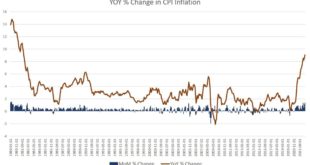The GDP (gross domestic product) statistic portrays a view that the key driving factor of economic growth is not the production of wealth but rather its consumption. Instead, it is a calculation of the value of final goods and services produced during a particular time interval, usually a quarter or a year. Since consumer outlays are the largest part of the overall demand, it is held by many commentators that consumer spending is the key driver of economic growth....
Read More »Exchange within Society
1. Autistic Exchange and Interpersonal Exchange Action always is essentially the exchange of one state of affairs for another state of affairs. If the action is performed by an individual without any reference to cooperation with other individuals, we may call it autistic exchange. An instance: the isolated hunter who kills an animal for his own consumption; he exchanges leisure and a cartridge for food. Within society cooperation substitutes interpersonal or social...
Read More »Contrary to Public Myths, Rent Control Hasn’t Been a Success in Sweden
Sweden’s rent control is widely touted by many who don’t understand economics as a model for how a property market should work. Young people in Ireland, for example, like to point to Sweden as a nirvana where rent control ensures easy availability of affordable and high-quality rental stock. I was once told by a young work colleague with strong socialist tendencies that they could move to Stockholm and get a high-spec modern apartment for a mere pittance compared to...
Read More »Toleration Does Not Require Calling Evil Good
In the early morning of July 6th, an explosion damaged a monument in Georgia known as the Georgia Guidestones. Because of the damage, the rest of the monument was demolished for safety reasons. The stones were erected by anonymous donors in 1980 and list ten principles for humanity. At the time of writing, it seems that the explosion was the result of purposeful sabotage. Writing at Marginal Revolution, Alex Tabarrok compares the willful destruction of the monument...
Read More »Covid-19 and the Continuing Erosion of Private Property Rights
This article is the second in a two-part series. Check out part 1 here. Even though the downhill trajectory we’ve seen over the last decades in terms of property rights is bad enough, nothing could have ever prepared us for what the covid-19 crisis would bring. Even those of us who have read enough history to know that there’s really no line that the state will not cross in its fervent pursuit of absolute power were sincerely surprised. How could the ruling elite...
Read More »How the World Embraced Nationalism, and Why It’s Not Going Away Soon
Perhaps one of the more astute observers of Russian foreign policy in recent decades has been John Mearsheimer at the University of Chicago. He has spent years warning against US-led NATO enlargement as a tactic that would provoke conflict with the Russian regime. Moreover, Mearsheimer has sought to explain why this conflict exists at all. Why, for example, doesn’t the Russian regime just accept US-led expansionism in the region? Or perhaps, more precisely, why have...
Read More »If Government Can Take from One Group, It Can and Will Take from Everyone
It wouldn’t be an exaggeration to argue that private property rights, as understood by classic liberal thinkers, by those who embrace Austrian economic theory, and by all members of an enlightened society, are not only the cornerstone, but also the last defense of human civilization and the Western way of life in particular. Nothing stands a chance without this premise. No prosperity can ever come about or even be maintained, none of the civil liberties and human...
Read More »The Fed Cannot Go Bankrupt; However, It Can Bankrupt the Country
A recent essay on the Mises Wire triggered quite a bit of discussion among a group of Austrian school economists. Paul H. Kupiec and Alex J. Pollock’s “Who Owns Federal Reserve Losses and How Will They Impact Monetary Policy?” became the focal point for a wide-ranging discussion of monetary issues that got to the heart of our monetary and overall economic future. The Fed Cannot Go Bankrupt The article itself is a fairly straightforward explanation of how the Fed...
Read More »Inflation Hits 9.1 Percent after Months of Empty Talk at the Fed
The US Bureau of Labor statistics released new Consumer Price Index inflation estimates this morning, and the official numbers for June 2022 show that price inflation has risen to 9.1 percent year over year. That’s the biggest number since November 1981, when the price growth measure hit 9.6 percent year over year. The month-over-month measure surged as well, with the CPI measure hitting 1.4 percent. That’s the highest month-over-month growth since March 1980, when...
Read More »Turns Out the Elites Like the Administrative State Better than Democracy
If there is a mantra among progressive American political and media elites, it would be “our democracy,” usually preceded by what they believe to be a threat from the Right. For example, progressives deemed the recent reversal of Roe “a threat to our democracy” because it removed laws regulating abortion from Supreme Court jurisdiction and returned the issue to democratically elected legislatures. It would seem inconsistent to invoke the democratic electoral process...
Read More » Swiss Economicblogs.org
Swiss Economicblogs.org










